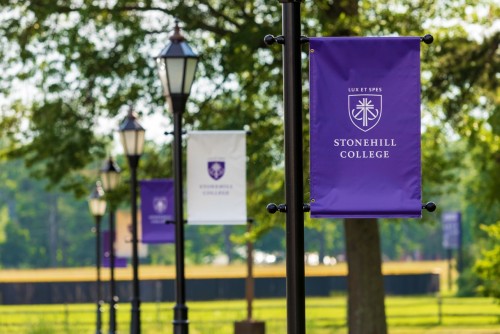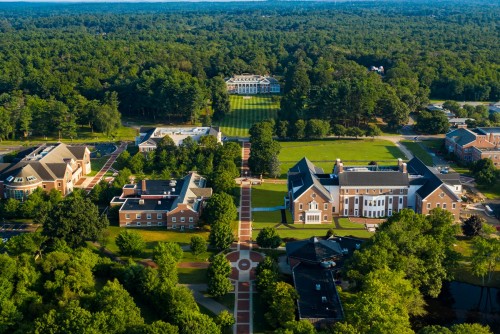An Undergrad at the Forefront of Alzheimer's Research
Stonehill Undergraduate Research Experience gives Christopher Dennehy ’23 the chance to work on a potentially groundbreaking treatment for Alzheimer’s disease.
Neuroscience major Christopher Dennehy ’23 is awed when he considers the research he helped conduct as part of the 2021 Stonehill Undergraduate Research Experience (SURE) Program could have major implications for the way doctors treat Alzheimer’s disease.
As a relative newcomer to professional research, he was also impressed by another aspect of the experience: how his more-seasoned co-researchers treated him as a peer.
“Nobody bossed me around just because they have been in the field longer than I have,” he says. “They understood it takes time to learn things and really took the time to teach me.”
The Norton, Massachusetts, native worked with a team of scientists at the West Roxbury VA Hospital Medical Center to develop a method to prevent the progression of Alzheimer’s disease, a neurological disorder characterized by the accumulation of amyloid-β proteins that aggregate into toxic plaques.
Professor John McCoy with Christopher Dennehy ’23
A Possible Groundbreaking Advance in Treatment
Their research focused on gamma oscillations, or fast brain waves, which have been shown to reduce this protein buildup and restore cognitive function. The team at the VA sought to demonstrate these effects in mice by stimulating neurons that control such oscillations.
“This research holds the potential for establishing a new target for the treatment of this devastating disease,” says Professor John McCoy of Stonehill’s Neuroscience program.
Dennehy was interested in working on a treatment for the disease because it is so prevalent. Over six million Americans live with the disorder, according to the Alzheimer’s Association.
“Even if everyone hasn’t had to deal with it individually, they know someone who has,” Dennehy says.
An Experience With Numerous Professional and Academic Benefits
In addition to the opportunity to work with distinguished scientists in the field, Dennehy’s SURE opportunity also allowed him to gain experience using cutting-edge research equipment and methods. His work involved specialized microscopy techniques to assess biological components indicative of Alzheimer’s in the brains of mice.
“I’ll be using these techniques if I get into a graduate program,” he says. “It’s like SURE is giving me a head start. Instead of learning them at 24 years old, I’m learning them at 21.”
The soft skills Dennehy honed should prove useful to him in graduate school and beyond.
“SURE trainees develop a deeper understanding of the science driving the experiments, as well as the confidence to interact effectively as part of a research team and to present the findings effectively at scientific forums and conferences,” McCoy says, noting that he, Dennehy and other members of their team will present their research this spring at the Northeast Undergraduate/Graduate Research Organization for Neuroscience conference.
In the meantime, Dennehy plans to continue taking advantage of Stonehill’s experiential learning offerings.
“Stonehill provides valuable research opportunities,” he says. “Working with researchers at the top of their field has felt surreal.”
Related
-
Request Information
Sign up now to be added to our mailing list, and we will show you how Stonehill could become part of your story.
-
Visit Opportunities
Our visit programs will help give you a better understanding of how Stonehill’s expansive leadership and experiential learning opportunities equip students for success in a rapidly evolving and globally competitive world.
-
Apply for Admission
Stonehill College provides an exceptional learning experience for both undergraduate and graduate students. We invite you to review the process, requirements and application deadlines for our entry options.


